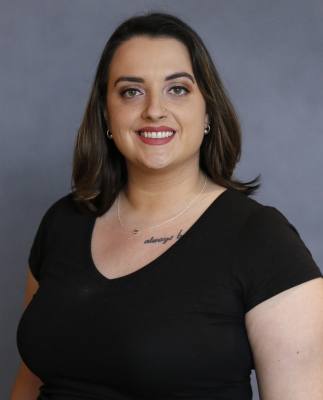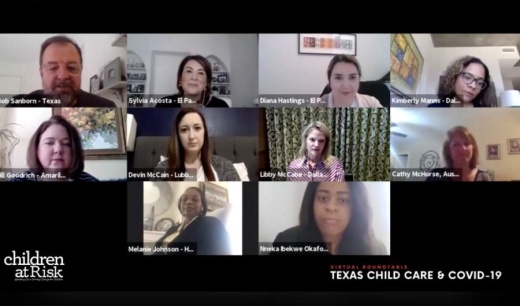Members of child care-focused nonprofits and advocacy groups emphasized the need for state investment in early education at a virtual roundtable discussion April 21 hosted by Houston-based nonprofit Children at Risk.
Several of the 10 panelists said that while their respective organizations had prepared for a surge in demand amid the coronavirus pandemic, that has not been the case so far. Rather, child care groups have put resources into informing and educating families about things like who essential workers are and how to receive government assistance.
“I think it's just [been about] trying to support and encourage people where they are,” said Jill Goodrich, the executive director at Opportunity School—Amarillo.
On April 10, Gov. Greg Abbott announced a new Frontline Child Care website to help essential workers in Texas locate child care and to support child care centers caring for children during the outbreak. The website, which integrates a mapping portal, was built through the collaboration of several state agencies, including the Texas Workforce Commission, the Texas Health and Human Services Commission, the Texas Education Agency and the Texas Higher Education Coordinating Board, according to a media release from the governor’s office.
Portal users can search for nearby facilities, facility operating hours and number of available slots; they can also find other basic health and safety information and step-by-step instructions for applying for child care financial assistance. Users also have access toTHHSC's inspection and compliance records.
The website includes guidance for front-line employers on how to assist employees in need, and also provides child care centers and school districts with resources to support their child care programs.
"The Frontline Child Care website will strengthen our child care capacity across the state, allowing our essential workers to continue their work to keep us safe and provide the critical services that Texans depend on,” the governor said in the release.
Panelists addressed how legislators should focus on the future of child care during the next legislative session. Cathy McHorse, vice president of Success By 6 with United Way for Greater Austin, applauded Abbott’s efforts to coordinate child care system improvements across the state but emphasized that child care is “woefully underfunded on a normal basis.”
Given the current pandemic, best practices at child care centers are now more expensive, so greater public investment must come with the exacerbated need, McHorse said.
In order for children to be school-ready, a positive relationship needs to exist between parents and the child care centers their children attend, said Melanie Johnson, president and CEO of Collaborative for Children—Houston.
“It’s not just a building that we’re trying to survive in order to provide parents the opportunity to go back to work. ... It’s also that this child is the future workforce,” she said.
However, child care goes beyond providing for children ages 0 to 3—it plays a role in children’s lives during the school year all the way into their early teens, said Sylvia Acosta, CEO of the YWCA El Paso del Norte Region.
Acosta added that she believes legislators have a lack of understanding of what constitutes quality child care. Child care providers need to be vetted to ensure they can properly give support to young children and help build them into future community leaders, eliminating lower-quality and unlicensed child care centers, Acosta said.
“We really need to have a much deeper conversation on funding of quality child care,” Acosta said.
The effect of the pandemic on children in low-income families has been a widely discussed topic; experts continue to debate whether those children are being left behind with schools closing their doors, said Bob Sanborn, Children at Risk president and CEO. He said that this same attention needs to be given to early education.
“When we don’t pay attention to early education, we’re leaving an entire group behind as well,” he said during the panel. “The state needs to see this much more than they have in the past.”





